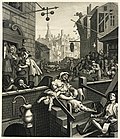Gin
Gin is a distilled spirit that is flavored with a variety of botanicals, most notably juniper berries. It is typically clear in color and has a strong, herbal flavor that is commonly associated with classic cocktails like the Martini and the Gin and Tonic.
History and Production[edit]
- Gin has its roots in the Netherlands, where it was first produced in the 17th century as a medicinal tonic. The use of juniper berries and other botanicals was believed to have health benefits, and the spirit was often prescribed as a cure for various ailments.
- Today, gin is produced in a variety of styles and with a wide range of botanicals. Most gins are made by distilling a neutral spirit with juniper berries and other botanicals, which can include citrus peel, coriander, angelica root, and many others.
Culinary Uses[edit]
- Gin is most commonly used as a base spirit in cocktails, where its herbal and botanical flavors can complement a wide range of other ingredients. Classic gin cocktails include the Martini, the Gin and Tonic, and the Negroni, among others.
- Gin is also used in cooking and baking, where its unique flavor can add depth and complexity to a variety of dishes. It is often used in marinades and sauces, and can also be used to flavor desserts like cakes and ice cream.
See also[edit]
-
Gin distillery in Decatur
-
Gin Lane by William Hogarth
-
The Gin Shop by Cruikshank
-
Bee's Knees cocktail
Ad. Transform your life with W8MD's Budget GLP-1 injections from $75


W8MD offers a medical weight loss program to lose weight in Philadelphia. Our physician-supervised medical weight loss provides:
- Weight loss injections in NYC (generic and brand names):
- Zepbound / Mounjaro, Wegovy / Ozempic, Saxenda
- Most insurances accepted or discounted self-pay rates. We will obtain insurance prior authorizations if needed.
- Generic GLP1 weight loss injections from $75 for the starting dose.
- Also offer prescription weight loss medications including Phentermine, Qsymia, Diethylpropion, Contrave etc.
NYC weight loss doctor appointmentsNYC weight loss doctor appointments
Start your NYC weight loss journey today at our NYC medical weight loss and Philadelphia medical weight loss clinics.
- Call 718-946-5500 to lose weight in NYC or for medical weight loss in Philadelphia 215-676-2334.
- Tags:NYC medical weight loss, Philadelphia lose weight Zepbound NYC, Budget GLP1 weight loss injections, Wegovy Philadelphia, Wegovy NYC, Philadelphia medical weight loss, Brookly weight loss and Wegovy NYC
|
WikiMD's Wellness Encyclopedia |
| Let Food Be Thy Medicine Medicine Thy Food - Hippocrates |
Medical Disclaimer: WikiMD is not a substitute for professional medical advice. The information on WikiMD is provided as an information resource only, may be incorrect, outdated or misleading, and is not to be used or relied on for any diagnostic or treatment purposes. Please consult your health care provider before making any healthcare decisions or for guidance about a specific medical condition. WikiMD expressly disclaims responsibility, and shall have no liability, for any damages, loss, injury, or liability whatsoever suffered as a result of your reliance on the information contained in this site. By visiting this site you agree to the foregoing terms and conditions, which may from time to time be changed or supplemented by WikiMD. If you do not agree to the foregoing terms and conditions, you should not enter or use this site. See full disclaimer.
Credits:Most images are courtesy of Wikimedia commons, and templates, categories Wikipedia, licensed under CC BY SA or similar.
Translate this page: - East Asian
中文,
日本,
한국어,
South Asian
हिन्दी,
தமிழ்,
తెలుగు,
Urdu,
ಕನ್ನಡ,
Southeast Asian
Indonesian,
Vietnamese,
Thai,
မြန်မာဘာသာ,
বাংলা
European
español,
Deutsch,
français,
Greek,
português do Brasil,
polski,
română,
русский,
Nederlands,
norsk,
svenska,
suomi,
Italian
Middle Eastern & African
عربى,
Turkish,
Persian,
Hebrew,
Afrikaans,
isiZulu,
Kiswahili,
Other
Bulgarian,
Hungarian,
Czech,
Swedish,
മലയാളം,
मराठी,
ਪੰਜਾਬੀ,
ગુજરાતી,
Portuguese,
Ukrainian



